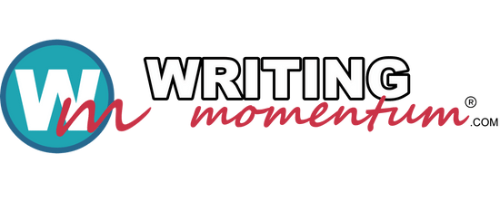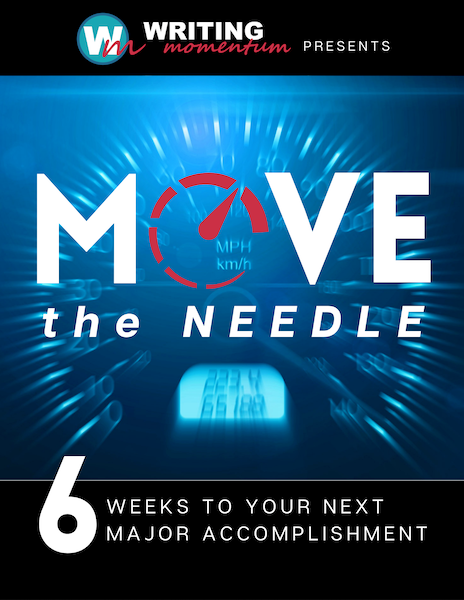Episode 130
Tapping into WHY You're a Writer
In this episode hosts Christopher and Gena Maselli delve into the essential topic of finding your 'why' as a writer. They discuss the significance of understanding your motivation for writing, whether it's to share knowledge, offer hope, or explore themes dear to you. The duo explains how knowing your why can boost creativity, productivity, and help you push through writer's block. Additionally, they share personal anecdotes and practical tips on how to keep your why front and center, from using sticky notes to setting daily phone alarms. Perfect for writers of all genres, this episode is a must-listen for anyone aiming to deepen their connection to their writing projects.
- 00:00 Introduction to the Writing Momentum Podcast
- 00:10 Understanding Your Why as a Writer
- 01:18 The Importance of Knowing Your Why
- 03:55 Personal Stories and Examples
- 06:48 Finding Your Why in Fiction Writing
- 10:50 Practical Tips for Staying Motivated
- 11:38 Homework and Final Thoughts
- 13:33 Conclusion and Farewell
LINKS:
- Liz Wilcox's Email Marketing Membership at http://wmdeal.com/liz
- Get your FREE Move the Needle goal-setting for authors ebook at https://www.writingmomentum.com
- Write with us! Join our writing membership and get your book DONE! https://www.writingmomentum.com/membership
Transcript
Why are you a writer?
Christopher:Hey, we're going to talk about that today.
Christopher:Welcome to the Writing Momentum podcast.
Christopher:I'm Christopher Maselli here with my wife, Gena.
Christopher:Hey, how's it going, Gena?
Gena:It's going really well.
Christopher:Today we're talking about finding your why as a writer.
Christopher:That sounds like a cliche.
Gena:It does.
Gena:It sounds like a cliche.
Gena:We actually wondered about a fancier or better way to talk about this, but
Gena:when it came down to it, we really wanted to explore really helping
Gena:understanding your why understanding your motivation is so important.
Christopher:Yeah, so why?
Christopher:So when you say understanding your why, you mean understanding
Christopher:your reason for doing this.
Gena:It's understanding your reason.
Gena:Is it about sharing your knowledge?
Gena:Is it about giving hope to people in the world or in a specific market?
Gena:Is it about sharing something you love?
Gena:All of these things, whether you write nonfiction or fiction, are important
Gena:for you to latch onto so that you will do the best job that you can do.
Christopher:I think sometimes that we think, Oh, it should be easy to know this.
Christopher:It should be easy to know exactly why I'm doing what I'm doing.
Christopher:But it's very easy the more you write to find yourself writing things that
Christopher:you're like Why does this matter?
Christopher:What am I doing this for?
Christopher:It's good to tap into that reason On not only the job itself as being
Christopher:a writer, but also on an individual project basis Why am I writing this book?
Christopher:Why is this important to me, right?
Christopher:And and so I I assume there's a lot a lot of benefits to knowing what your why is.
Gena:Yeah, there's definitely some benefits I think the thing is when
Gena:you are A lot of people talk to me and they'll say, I want to be a writer.
Gena:I have always wanted to write a book.
Gena:But until you really latch on to that why, what it is that you are trying to
Gena:do, it's going to be easy for you to abandon the project and not finish it.
Gena:It'll be easy for you not to do it in the best way possible.
Gena:Or it'll be easy for you just to kind of lose your way and lose your motivation.
Gena:Like it's, it's easy.
Gena:There's a dip that happens when you're writing that if you're not careful, it
Gena:will make you stop writing a project.
Christopher:So it's just not wanting to always having written a book.
Christopher:That's not enough?
Gena:I don't know that that's enough.
Gena:I think that's enough maybe for something.
Gena:For some people, that will be enough of a why, but for other people, and I
Gena:would say a deeper motivation would be, why are you writing that specific book?
Gena:Why does that story resonate with you?
Gena:Why is that topic something that you need to bring to market?
Christopher:Yeah.
Christopher:And that's, that's important because if you know what your why is, it makes
Christopher:the writing so much easier, right?
Christopher:It'll make you more creative when you write and make you
Christopher:more productive when you write.
Christopher:It will help if you've got writer's block, right?
Christopher:And you don't know where to go next.
Christopher:A lot of times that's because we don't have the intrinsic understanding
Christopher:of why we're writing the book.
Christopher:And so that right, it says something at some point that we
Christopher:might stumble on comes up and it's like, We can't get past it, right?
Christopher:Because it's just like, uh, I don't know.
Gena:Yeah
Christopher:it brings clarity.
Gena:It brings clarity for it.
Christopher:And it helps you finish the book then, right?
Christopher:You're not just writing it, but you're actually getting the book done then.
Gena:Yeah, because like I said, there's this dip that can happen when you're
Gena:writing books where you kind of can get into that middle section that you can
Gena:kind of find yourself a little bit lost.
Gena:So I think it's an important part of just finding your personal why.
Christopher:Absolutely.
Christopher:And when you find out what the why is, and I mean, really,
Christopher:that's what it's all about, right?
Christopher:Because like, okay, I write children's books, let's say, and I might write
Christopher:children's books because I want to feed the into the lives of children.
Christopher:I want to help them become stronger individuals and grow
Christopher:up as stronger individuals.
Christopher:But when I'm working on an individual book, there might be
Christopher:a specific reason for that book.
Christopher:For instance, when I wrote a Reality Shift, which is my book about a boy who
Christopher:gets a laptop and discovers that whatever he types into, it actually happens.
Christopher:It's really a book about the power of words.
Christopher:And I wanted to share this message that your words matter.
Christopher:As a 12, 13 year old boy, your words, the words you say to others, the words
Christopher:you speak into the world, the words you tell yourself, those all matter.
Christopher:And so that's the message I wanted to get across in that book.
Christopher:But reaching kids as a whole was the reason I was writing in the first place.
Gena:Yeah.
Gena:And I think for me, I started writing and I had always kind of wanted to
Gena:write a book, but I quickly discovered that the projects that I were
Gena:working on were giving people hope.
Gena:They were giving people hope.
Gena:They were giving people purpose.
Gena:And that became being part of those kinds of projects was really, An exciting
Gena:thing for me and that counts whether I've been working on book projects or even
Gena:if I've been working on newsletters or on emails or on blog posts or Articles
Gena:those kind of things that I can bring a person's story to life or I can bring a
Gena:message to life and I can help with that.
Gena:That is a very empowering thing and it gives me purpose in my,
Gena:in my writing and in my life.
Gena:I feel like what I'm doing isn't just helping people make a bunch of money.
Gena:It's because there is a why associated with it for myself and for others.
Christopher:Yeah.
Christopher:There's kind of a, there's this smaller reason, bigger reason, and it's all.
Christopher:It's important to make sure that you've got that reason.
Christopher:I think it's very easy as you write more projects to get to this point
Christopher:where you're just writing, right?
Christopher:And you can write just for money, which, that might be your reason, right?
Christopher:You want to be able to make a living and, and, and work from home kind of thing.
Christopher:And that's okay.
Christopher:That's totally a valid reason.
Christopher:But if you don't know that that's the reason you're doing it, it might make
Christopher:it to where you don't have clarity when you're putting these projects together.
Gena:You won't push through, you won't push through those
Gena:when that project gets difficult.
Gena:Or, uh, when you're, you've got something else to learn, it
Gena:becomes difficult, uh, to, to do.
Gena:But if you've got that why, then it keeps you pushing.
Gena:And I wanted to point out, Chris, you were talking about, I think it's easy
Gena:for people to think about finding their why when they're writing nonfiction.
Gena:Cause a lot of times nonfiction comes out of a pain point for the author that
Gena:they want to share, or it comes out of their education, or it comes out of some
Gena:kind of, something that they've learned that they want to bring to the world.
Gena:But this idea of finding your personal why is important even
Gena:for, for fiction writers as well.
Gena:Like you said, you were writing to children or to middle graders.
Gena:You were bringing this message of this theme, right?
Gena:That the power of words, it was this idea of you brought a theme to your
Gena:writing and that kind of thing becomes
Gena:important for fiction writers as well.
Gena:This idea of finding your why.
Gena:And it can be that you love a particular genre.
Gena:And so you want to just entertain people, but maybe think about it
Gena:in terms of, okay, is, is what I'm writing just a fun beach read that
Gena:helps someone kind of recharge, kind of disconnect from the stress,
Christopher:which is totally valid reason
Gena:is valid reason, that you're giving people just a fun adventure or
Gena:fun romance that they can, you know, kind of, it gives them a safe space.
Gena:We've talked about safe spaces.
Gena:It gives them mentally a place that they can just go and
Gena:be entertained and have fun.
Gena:So, um, it can also be, uh, maybe you're introducing people to a part of the world,
Gena:or if you're writing fantasy, maybe it's an idea that you're taking people to a
Gena:new world that you've created, and you want to share this beauty with them.
Gena:Uh, you know, I love the idea of this, uh, this idea of creating worlds.
Gena:I believe I read, read that Tolkien's motivation for writing, uh, the, the
Gena:Lord of the Rings trilogy was that he was a linguist and he wanted to explore
Gena:this idea of language and bringing this beauty of language to life, which I
Gena:think, okay, here's a man whose work is, is lasting for generations now.
Gena:It's beautiful.
Gena:It's, it's, I mean, high fantasy.
Gena:He's just created this entire world and we're still enjoying it today, but it came
Gena:from his place as a linguist wanting to, and I'm, he probably wasn't a linguist.
Gena:There's probably a fancier name for it, but he was looking at
Gena:the roots of words, I believe.
Gena:And that's what he was bringing.
Christopher:And so, so what your why might be is something really deep
Christopher:like that, or it might be something that's lighter, but either one's okay.
Christopher:And it might be for something deep, like a full on book, or it could be
Christopher:something light, like an article.
Christopher:And.
Christopher:You know, because I was thinking about that after you said that.
Christopher:And you know, I have projects that I work on that are very simple, sometimes
Christopher:finishing an afternoon projects, right?
Christopher:They're not big projects.
Christopher:But I thoroughly enjoy them and it's often because I know that that item is still
Christopher:gonna either have an impact on someone or It's just gonna make someone laugh or
Christopher:there's just something about it That is special to me and that's the why I try
Christopher:to figure out what that is And then I really find myself having motivation to
Christopher:write it and that is important because sometimes You can get stuck on those
Christopher:kind of things because they can be hard to push through when you've got other
Christopher:things on your plate You But if you know your why, you can get it done.
Gena:Well, and I would say even for both of us, there are times that we have
Gena:taken projects and worked on projects that were not high dollar projects
Gena:and we've done them because of that.
Gena:Why we've done them because we knew we were bringing something
Gena:to life that was important.
Gena:or that was meaningful for us and it was worth it for us to work on.
Christopher:Yeah.
Christopher:This is the kind of thing that in our membership that we have on our
Christopher:website, if you go to writingmomentum.
Christopher:com, it's the kind of thing we discuss all the time in our weekly get togethers.
Christopher:We get together for about an hour every Wednesday and we have a short
Christopher:teaching and then we, We write together, we co write together for 45
Christopher:minutes on our individual projects.
Christopher:It's just a way to have accountability, get our stuff done.
Christopher:And the writers in our space, man, they are getting things done.
Christopher:But there's something about having this regular reminder of why we're doing
Christopher:what we do that works out so well.
Christopher:So, Hey, if you're looking for a group to join, join us at writingmomentum.
Christopher:com.
Christopher:It's a low cost, $25 a month membership.
Christopher:Just is a great way for you to jump in and have a way to be
Christopher:accountable and to get things done.
Christopher:Meanwhile, this week, here's what we challenge you to do.
Christopher:Sit down and ask yourself these questions.
Christopher:Why are you writing overall?
Christopher:Why do you want to be a writer?
Christopher:What do you hope to achieve?
Christopher:Who are you writing for?
Christopher:And, On those individual projects, why are you writing those?
Gena:And even what do you hope your readers gain from what you're writing?
Christopher:Yes.
Gena:What do you want to bring and give to them?
Gena:Because that really is, you're giving a creative work, whether it's
Gena:in fiction or non fiction, you're giving this work to them in hopes
Gena:that they gain something from it.
Gena:So think about that as well.
Gena:What do you hope that they will gain?
Christopher:So there's your homework.
Christopher:Sit down, write that out.
Christopher:What is your why when it comes to your overall job and when it comes
Christopher:to individual tasks that you work on?
Gena:And then the other thing we encourage you to do is give yourself
Gena:a reminder, print out some kind of reminder, you know, or write it down.
Gena:If you're somebody who loves sticky notes, write a sticky note or print it out that
Gena:really encapsulates what your why is.
Gena:Really, really write down what your why is and then put it somewhere
Gena:where you will see it regularly.
Christopher:You know what I've seen people do, and this is kind of cool,
Christopher:they'll take and they'll create a, an alarm on their phone and they'll
Christopher:put their why on the name of the alarm so that every day at 9 a.
Christopher:m.
Christopher:for instance, their phone rings with an alarm and they look down and they
Christopher:see their why right in front of them.
Christopher:It's a great way to keep that in front of you.
Gena:It does.
Gena:Cause man, we both know that life will come and try to
Gena:distract you from that why?
Gena:You know, there, there are bills to pay that are, there are
Gena:family members to take care of.
Gena:But if you've got that why, it'll help you in carving out some time
Gena:for yourself to make that why happen.
Christopher:Absolutely.
Christopher:Absolutely.
Christopher:So, hey, if you've enjoyed this podcast, would you share it with someone who,
Christopher:you know, needs to be reminded, that what they're writing is important.
Christopher:It's really easy to share it.
Christopher:Usually you could just take a link or the look for that little share button
Christopher:and you can send it to someone by text or you can send it to their email or
Christopher:you might even be able to share it right in the app that you're using.
Christopher:And in that way they can find this kind of good stuff too.
Gena:We are so glad that you've been here with us today.
Gena:Um, we do not take your time lightly.
Gena:We know that, um, you're carving out time for this.
Gena:And this also just shows that writing is important for you when
Gena:you listen to podcasts like this.
Gena:It shows that writing is important and it's one more way that you're
Gena:keeping that vision in front of you and that you're not losing sight of it.
Gena:So we hope you will come back and join us next time on the Writing Momentum podcast.
Christopher:Because together
Gena:we have writing momentum.
Christopher:Bye bye.





